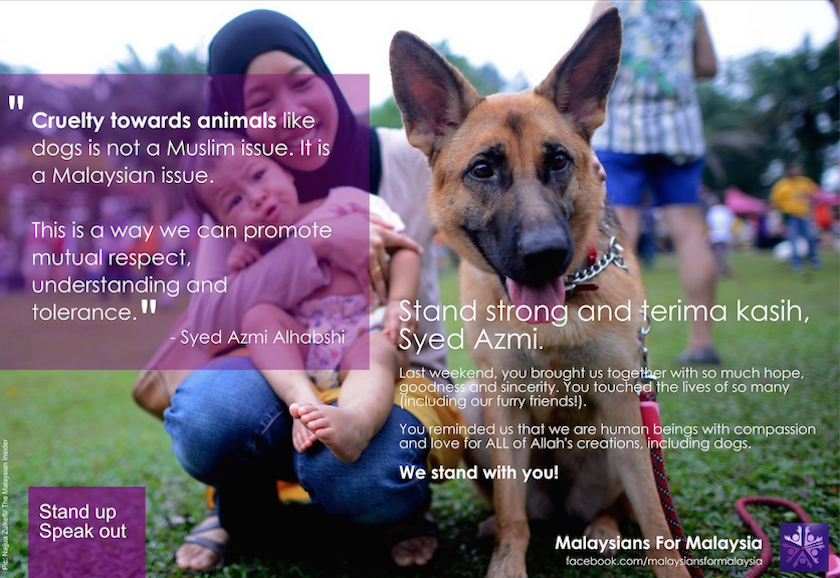KUALA LUMPUR, Oct 27 — Last Saturday, pharmacist Syed Azmi Alhabshi was forced to apologise publicly for organising a canine-awareness event that gave many of his fellow Malay Muslims the chance to touch a dog for the first time in their lives.
In his apology — made at a news conference that was ostensibly his first public appearance since receiving slanderous vitriol and death threats — Syed Azmi who inadvertently became the event’s “face” said he had not intended to make Muslims stray from their faith. The storm however, has not abated.
Here are three things we learnt from the furore that resulted from the “I Want to Touch a Dog” event.
Dogs are really a big deal for Malaysian Muslims
The violent backlash from some in the local Muslim community might have shocked a lot of non-Muslims, including the global community. The news was carried by many international news publications and held a tone of disbelief.
The situation might have even shocked Muslims abroad. For Muslims elsewhere, these hounds are common pets which they keep as guide dogs, guard dogs and hunting companions despite being tagged najis, or ritually unclean status in Islam.
In Malaysia, however, the stigma associated with dogs is seen to be a graver sin than drinking alcohol, only slightly below the “biggest sin” of all — eating pork.
Detractors have questioned Syed Azmi’s motive for holding the event, claiming that a dog’s role in Islam is clear, and there is no mistreatment of dogs in Malaysia among Muslims.
However, the degree of which some Malaysian Muslims went berserk after seeing photos of Malay girls in headscarves hugging dogs proved Syed Azmi right. There is a huge negative perception towards dogs among Muslims here.
Religious authorities are clawing for control
Some in the Malay-language media were quick to highlight reactions from the country’s various state muftis and religious authorities, with headlines insinuating that the event had “insulted Islam” and demanding the Muslim participants “repent”.
It was clear from the response of Datuk Othman Mustapha, the director-general of the Islamic Development Department of Malaysia (Jakim), that the religious authorities were at a loss to deal with the younger set of Muslims who chafe at the way they are being “managed” and not allowed to question how their creed is practised here.
The authorities reacted the only way they know how. They insisted that within the country’s borders, not only is the Sunni denomination and the Shafi’i school of jurisprudence the only right way to practise Islam, but Muslims must also accept only Jakim’s interpretation of the religion.
Instead of self-reflecting on why the event resonated with the Muslim participants who made up some of the 200-odd participants at the dog event, some Muslim leaders resorted to creating bogeymen of the organisers, accusing the latter of being tools of a so-called “liberal” conspiracy to divide the Muslim community.
But the truth is that younger Malaysian Muslims with access to a wider pool of information on Islam today are finding they have less in common with the country’s muftis and ulamas.
As such, the Islamic religious authorities are fast losing their relevance, and with it, their iron grip on the lives of Muslims nationwide.
We do not know how to deal with hate speech
In a skewed interpretation of “freedom of speech”, local Muslim group Pembela claimed on its website that those opposed to the dog petting event too have a right to make death threats against Syed Azmi and criticise the event, even if their views were slanderous.
Meanwhile, Putrajaya and the religious authorities have kept mum over the vitriol and killer threats, with Communication and Multimedia Minister Datuk Seri Ahmad Shabery Cheek claiming that the matter is out of his ministry’s hands despite being the country’s Internet regulator. According to the minister, such criminal actions are to be dealt with solely by the police.
But the federal government’s handling of “offensive speech” has been largely a hit-and-miss affair. They have been seen to punish those who have made provocative statements that offend the sensibilities of some or those who feel they have been insulted, but they are also seen to have ignored unequivocal threats calling for harm on a person.
Instead of outlawing all speech seen to be racially or religiously provocative, Putrajaya should instead open up spaces for Malaysians to disagree, and to drown out “bad speech” with “good speech”, without fear of physical harm and death threats.
If anything, the National Unity Consultative Council’s draft of Harmony Bills which aims to criminalise hate speech that threatens physical harm, has shown it is increasingly needed to deal with such venomous statements that poison Malaysian society today.



















